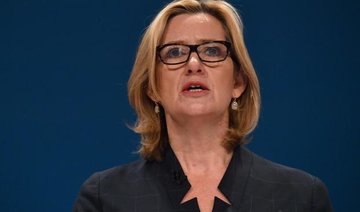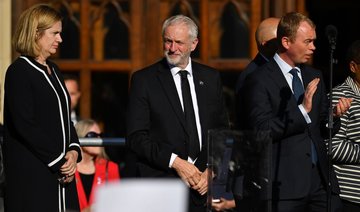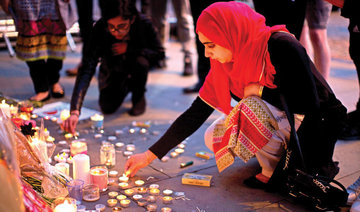MANCHESTER: Soldiers were being deployed to key sites in Britain on Wednesday to prevent attacks after the terror threat level was raised to its highest level following a suicide bombing in Manchester that killed 22 people, including children.
Prime Minister Theresa May announced late on Tuesday that the threat level was now considered “critical,” meaning an attack may be imminent.
Police had earlier named British-born Salman Abedi, 22, as the perpetrator of the bombing at the Manchester Arena indoor venue at the end of a concert by US pop singer Ariana Grande on Monday, attended by thousands of children and teenagers.
The identities of the victims were becoming known little by little. They included an eight-year-old girl, two teenage girls and a 28-year-old man. A Polish couple who had come to collect their daughters after the concert also died, Poland’s foreign minister said. The daughters were safe.
The bombing also left 59 people wounded, some with life-threatening injuries.
“Whilst some of what we are doing will be obvious to the public there is a huge amount of work happening day and night that the public will never know about,” Commander Jane Connors, leading the London policing operation, said.
The Manchester attack was the deadliest in Britain since July 2005, when four British Muslim suicide bombers killed 52 people in coordinated attacks on London’s transport network.
US security sources, citing British intelligence officials, said Abedi was born in Manchester in 1994 to parents of Libyan origin.
British investigators were looking into whether Abedi had traveled to Libya and whether he had been in touch with Daesh militants there or in Syria.
The Times newspaper said Abedi was believed to have returned to Britain from Libya recently.
“ATTACK MAY BE IMMINENT“
May said it was possible a wider group was linked to the bombing, prompting the deployment of troops a little more than two weeks before a June 8 national election.
An independent body which sets the threat level recommended it be raised to “critical” from “severe” for the first time since June 2007.
“This means that their assessment is not only that an attack remains highly likely but that a further attack may be imminent,” May said in a televised statement from her Downing Street Office after a meeting of the government’s crisis response committee.
“Armed police officers responsible for duties such as guarding key sites will be replaced by members of the armed forces ... You might also see military personnel deployed at certain events, such as concerts and sports matches.”
Britain’s top anti-terrorism officer Mark Rowley said events would only go ahead when it was safe to do so and the decision to raise the threat level had been made on a “precautionary basis” due to gaps in police knowledge while the investigation continues.
He told reporters he hoped that, as has previously been the case, the level would not stay at critical for a long period.
Attacks in cities including Paris, Nice, Brussels, St. Petersburg, Berlin and London have shocked Europeans already anxious over security challenges from mass immigration and pockets of domestic Islamic radicalism.
Islamic State, now being driven from territories in Syria and Iraq by Western-backed armed forces, claimed responsibility for the Manchester attack, but there appeared to be contradictions in its account of the operation.
The militant group has repeatedly called for attacks on Western countries as retaliation for their involvement in the conflicts in Syria and Iraq.
Britain deploys troops to prevent attacks after Manchester suicide bombing
Britain deploys troops to prevent attacks after Manchester suicide bombing

Le Pen appeal trial opens with French presidential bid at stake

- Le Pen, 57 entered the packed courtroom on Tuesday afternoon flanked by two lawyers
- If the court upholds the first ruling, Le Pen will be barred from running in the 2027 election
PARIS: The appeal trial of Marine Le Pen opened Tuesday, with the French far-right leader hoping to overthrow a graft conviction and save her 2027 run for president.
The appeal comes after a French court last year barred her from running for office for five years over a European Parliament fake jobs scam involving her and other officials from her National Rally party.
The three-time presidential candidate was also handed a four-year prison sentence, with two years suspended, and fined 100,000 euros ($116,000).
Le Pen, 57, who has always maintained her innocence, entered the packed courtroom on Tuesday afternoon flanked by two lawyers, in the hopes of clearing the way for a fourth bid to become president.
If the court upholds the first ruling, Le Pen will be barred from running in the 2027 election, widely seen as her best — and possibly last — chance to win the country’s top job.
She again risks the maximum sentence — 10 years in prison and a one-million-euro ($1.16 million) fine — if the appeal fails.
She could, however, still be a candidate if she is sentenced to a shorter ban and no time to serve under house arrest.
Earlier on Tuesday, Le Pen said she was hopeful the court would listen to her side of the story.
The hearing is expected to last a month, with a decision expected this summer.
Twelve of the accused, as well as the far-right party itself, have appealed against the verdict.
Another 12 people — including one of Le Pen’s sisters — have decided to accept their convictions without appealing. Another person sentenced has since died.
- Risk of reoffending -
The initial verdict dealt a heavy blow to Le Pen and the RN, which has surged in French politics in recent years.
The court found her guilty — along with 24 former European Parliament lawmakers, assistants and accountants as well as the party itself — of operating a “system” from 2004 to 2016 using European Parliament funds to employ RN staff in France.
Le Pen walked out of the courtroom during the sentencing, later slamming the verdict as a “political decision.”
The judges defended the decision to bar her from running, saying elected officials should not benefit from “preferential treatment” and citing the risk of reoffending.
The news sparked shock among Le Pen supporters in France, while the US President Donald Trump and the Kremlin expressed concern.
Former Trump adviser Steve Bannon said last week he hoped Le Pen could run for president despite her legal troubles so her election could help “break” the European Union.
- Bardella in the wings -
Le Pen took over the former National Front (FN) from her father Jean-Marie Le Pen in 2011 and has since sought to clean up the party’s image.
Her father, who died in January, was often accused of making racist and antisemitic comments.
After coming third in the 2012 presidential polls, Marine Le Pen made the run-off in 2017 and 2022 but was beaten by Emmanuel Macron on both occasions.
Yet 2027 could see a different outcome for the far right, with Macron barred from standing again under France’s constitution.
Some 42 percent of French people said they agreed with “ideas defended by the RN,” up from 29 percent before the 2022 vote, according to a poll by consultancy firm Verian for Le Monde published on Sunday.
If she cannot be a candidate, Le Pen has said her top lieutenant Jordan Bardella — the RN party’s president who is not a defendant in the trial — can run in her place.
“Bardella can win instead of me,” Le Pen said in December.
A poll in November predicted that Bardella would win the second round of the 2027 elections, no matter who stands against him.
But Bardella said on Monday that a ruling preventing Le Pen from running “would be deeply worrying for democracy” and insisted he was not so far a candidate for president but prime minister.














